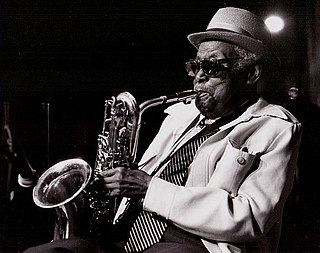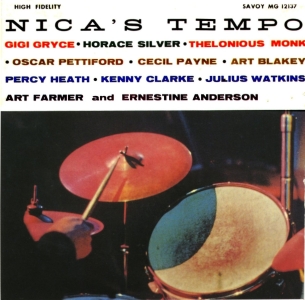
Donaldson Toussaint L'Ouverture Byrd II was an American jazz and rhythm & blues trumpeter and vocalist. A sideman for many other jazz musicians of his generation, Byrd was known as one of the rare bebop jazz musicians who successfully explored funk and soul while remaining a jazz artist. As a bandleader, Byrd was an influence on the early career of Herbie Hancock.

Arthur S. Taylor Jr. was an American jazz drummer, who "helped define the sound of modern jazz drumming".

Gigi Gryce, later Basheer Qusim, was an American jazz saxophonist, flautist, clarinetist, composer, arranger, and educator.
Julius Watkins was an American jazz musician who played French horn. Described by AllMusic as "virtually the father of the jazz French horn", Watkins won the Down Beat critics poll in 1960 and 1961 for Miscellaneous Instrument.

Irving Sidney "Duke" Jordan was an American jazz pianist.

Meet Betty Carter and Ray Bryant is a 1955 jazz album by singer Betty Carter and pianist Ray Bryant both debuting here on record as leading artists. Although Carter is mentioned first, she is only featured on half of the tracks. On three of the six songs Jerome Richardson is also heard on flute. The other half is recorded by the Ray Bryant Trio alone.

Social Call is an album by Betty Carter featuring Ray Bryant and a big band arranged by Gigi Gryce. Of its eleven tracks, the first six were recorded in 1955 and originally released as part of the album Meet Betty Carter and Ray Bryant. The other five tracks were recorded in 1956 but remained unissued until this compilation, which Columbia Records released in 1980.

I Can't Help It is a 1992 Betty Carter compilation album. It contains all of the tracks from her albums Out There with Betty Carter and The Modern Sound of Betty Carter. The same combination of tracks had previously been released as a double LP by ABC Records under the title What a Little Moonlight Can Do.

Out There is a bebop album by jazz vocalist Betty Carter with an ensemble under the direction of alto saxophonist Gigi Gryce. The arrangements were provided by Gryce, Ray Copeland, Melba Liston, Benny Golson and Tommy Bryce. The album was produced by Esmond Edwards and released 1958 on Peacock Records. Ron Wynn of Allmusic called the album "a dynamic set."

Cecil Payne was an American jazz baritone saxophonist born in Brooklyn, New York. Payne also played the alto saxophone and flute. He played with other prominent jazz musicians, in particular Dizzy Gillespie and Randy Weston, in addition to his solo work as bandleader.
"It Don't Mean a Thing " is a 1931 composition by Duke Ellington with lyrics by Irving Mills. It is now accepted as a jazz standard, and jazz historian Gunther Schuller characterized it as "now legendary" and "a prophetic piece and a prophetic title". In 2008, Ellington's 1932 recording of the song was inducted into the Grammy Hall of Fame.

Calvin "Cal" Massey was an American jazz trumpeter and composer.
Daniel Asbury Mixon is an American jazz pianist.
Wendell Marshall was an American jazz double-bassist.

Nica's Tempo is the most common latter-day title of an album by the Gigi Gryce Orchestra and Quartet, recorded and first released in late 1955. The title track is a reference to Nica de Koenigswarter a.k.a. "The Bebop Baroness" or "The Jazz Baroness", a patron of jazz musicians such as Thelonious Monk and Charlie Parker.
The Central Brooklyn Jazz Consortium (CBJC) created the Brooklyn Jazz Hall of Fame in 1999. A museum component added in 2009 to immortalize musicians, venues, and preserve artifacts which perpetuate Brooklyn's jazz legacy.

Afro-Cuban is an album by American jazz trumpeter Kenny Dorham. The first release of the album dates back to 1955 on 10" Vinyl, featuring only four tracks and having a different cover artwork. Some time later, Blue Note decided to add three tracks and issue a more complete LP toward the end of May 1957. After publishing a 2003 RVG edition which featured two additional pieces and a different track listing, Blue Note remastered and recompiled Afro-Cuban in 2007, restoring the original track order.

Uhuru Afrika is an album by American jazz pianist Randy Weston recorded in 1960 and originally released on the Roulette label. The album features lyrics and liner notes by the poet Langston Hughes and was banned in South Africa in 1964, at the same time as was Lena Horne's Here's Lena Now!, with copies of the albums being seized in Johannesburg and Cape Town.

Doin' the Gigi is an album by American saxophonist Gigi Gryce compiling live and studio recordings from 1957 to 1961 which was released on the Uptown label in 2011.













